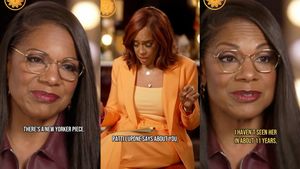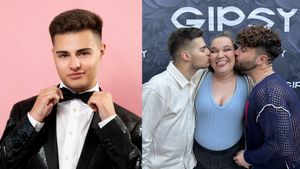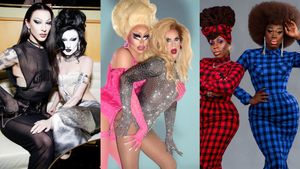For over 120
years families have come to the White House on the Monday
after Easter to take part in the annual Easter Egg Roll. The
event, put on by the National Park Service, revolves
around young children who roll eggs across the White
House lawn. It includes a visit from the Easter bunny
along with music, storytelling, and food giveaways for the
whole family.
It's just
this kind of national event--one that focuses on
families--that members of the Family Pride
Coalition say should include gay and lesbian parents
and their children. "Our families are participating
in all aspects of traditional American life, and we
should have the opportunity to participate in this
longtime iconic American event," says Corri
Planck, deputy executive director for Family Pride.
News of Family
Pride's planned participation on April 17 made
headlines as antigay religious leaders criticized the
group for planning to "crash" the White
House to promote a "radical homosexual
agenda." But that did nothing to discourage the
more than 200 families that had committed to attend
through Family Pride.
As state
lawmakers increase their efforts to ban adoption by gays and
lesbians, Family Pride is making its presence known as the
only national organization exclusively dedicated to
securing equality for LGBT parents and their families.
Small in size and budget, the 27-year-old nonprofit
group has nevertheless become a powerful force on the front
lines of the gay rights movement, and this year could
be its biggest challenge yet. "In 2003 there
were a handful of bills being filed in a handful of states
that would attack family recognition and family protection
issues for the gay community," says Family
Pride executive director Jennifer Chrisler. "In
2006 we are talking about five or six states with
constitutional amendment [proposals] and seven or
eight states with statutory legislation being filed to
prohibit our ability to parent and protect our kids.
The magnitude and scope of what we are talking about is so
exponentially larger than anything we've ever seen
before in terms of attack on our families."
Most family law
and legal recognition is created at the state level, so
the Washington, D.C.-based coalition has long been
fighting for rights on a state-by-state basis. Florida
has the country's only blanket ban on adoption
by gays, but lawmakers in Ohio, Kentucky, and
Georgia--all of which approved constitutional
amendments to ban same-sex marriage in 2004--are
pressing for laws similar to the one in Florida, while
discussions are under way to do the same in a dozen other
states.
"I think
this really is the year that people are going to come to
understand how incredibly vicious their attacks are [as they
attempt to] strip away whatever rights and protections
we've been able to carve out for
ourselves," Chrisler says.
Many gay rights
groups faced heavy criticism for failing to defeat a
single one of the 13 state ballot measures against same-sex
marriage in 2004. But Family Pride has managed to
achieve some key victories in recent years against
legislation seeking to limit or deny the rights of
gays and lesbians. In Texas in 2003, Family Pride got 300
people to sign witness affirmation forms against a
bill that would have prevented all single unmarried
people from becoming foster parents, and more than 40
testified in committee against the bill. "What Family
Pride did in Texas was to put a human face on the
debate," says Chris Caldwell, an attorney and
past cochair of the organization. "We had real kids,
real moms, and gay dads to look the legislators in the
eye and to walk the hallways."
Family Pride
brought to the hearings LGBT people and straight allies from
the districts of each committee member considering the Texas
bill. Now the group is employing that strategy in
other states through Outspoken Families, a national
speakers bureau launched in December with more than
200 participant families. "We certainly feel strongly
about real families giving real information about who
they are, what their lives are about, and what their
daily struggles are," Chrisler says. "At the
end of the day, [antigay legislation] impacts
thousands and thousands of children all across this
country."
Family Pride was
officially formed in 1979 as the Gay Fathers Coalition,
a group of gay fathers seeking custody of their children.
Most of these men were not out to their children and
had acrimonious relationships with their ex-wives.
"It was a very different place and time,"
remembers Tim Fisher, the first executive director of
the organization. "Coming out later in life,
they felt like outsiders and didn't feel
they'd have a fair shot in court."
As times changed,
the organization got more political, and by 1986 it had
become coed and its name was changed to Gay and Lesbian
Parents Coalition International. When former Vice
President Dan Quayle made his famous speech in 1992
deriding television character Murphy Brown as a poor role
model because she was a single parent, the organization
gained widespread notoriety. What is less known is
that in his speech Quayle also described lesbian
mothers as "immoral." "We were getting
25 media requests a day, and we had to start
justifying ourselves," Fisher says. "It was
also the time that second-parent adoptions in the
courts were starting to crop up, so there was a bit of
momentum."
Since then,
Family Pride has taken on the mantle of supporting gay
families who may unexpectedly find themselves in the media
glare. That was the case with Vermont couple Gillian
Pieper and Karen Pike and their three kids, whose
appearance on the PBS kids show Postcards from Buster
ignited a national debate after U.S. education secretary
Margaret Spellings strongly denounced PBS and PBS
station WGBH of Boston for producing the episode.
"They are
just this tiny organization, good people trying to
help," Pieper says of Family Pride.
"They are unbelievably small in staff and
gigantic in heart and passion. We were about 11/2
weeks into it when the phones wouldn't stop
ringing. Then Family Pride contacted us. They took a
really proactive approach to try to bring attention to this
and let people know that this was not OK."
Family Pride,
which didn't even have a paid executive director
until 1997, has been receiving the support it needs to
take public stands like its campaign for a presence at
the White House Easter event. Since 2001 the
organization has nearly doubled its database and budget,
while expanding its capacity through its e-newsletter,
which reaches nearly 35,000 people.
In 2005, Family
Pride's budget was still a mere $800,000. But with
such a daunting set of challenges ahead they were able
to increase their 2006 budget to more than $2 million
through corporate sponsorships, grant money from
foundations, and membership dues of $35 a year. They now
have a membership base of about 10,000.
Still, the work
is done by only seven full-time staff members, including
Planck in Los Angeles and Chrisler in Washington, D.C.
Chrisler says that whatever success Family Pride and
other LGBT groups are able to achieve at the ballot
box this year will only be the beginning. "You have
to pull out all the stops on these short-term
battles," she says. "We have to
recognize that changing the poll numbers, changing the
public perception at large around marriage and around
family recognition issues and the rights of LGBT
people to be able to be parents, is not a one-year battle.
It's probably a 10- or 15- or 20-year battle."


















































































